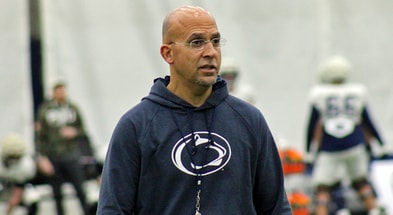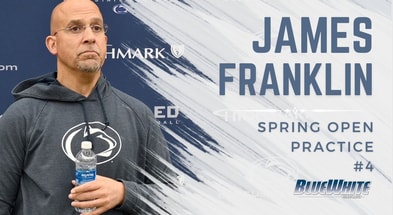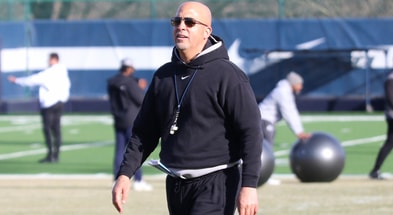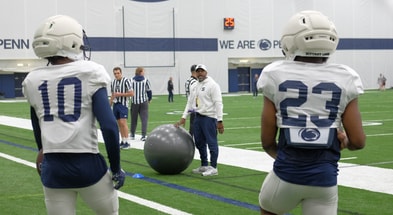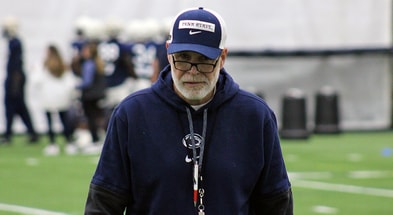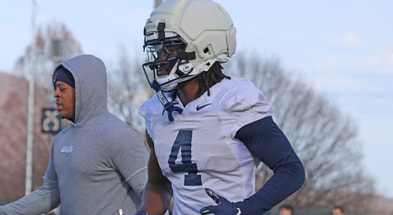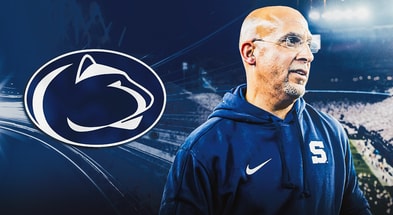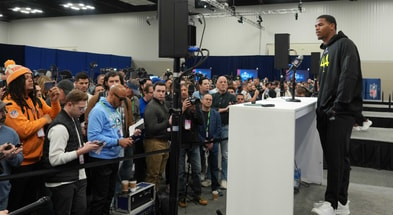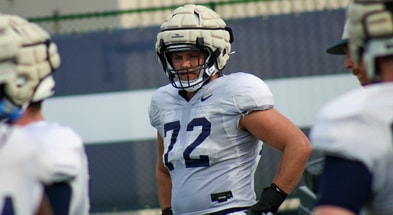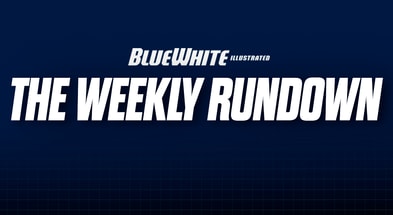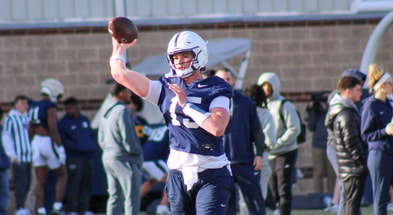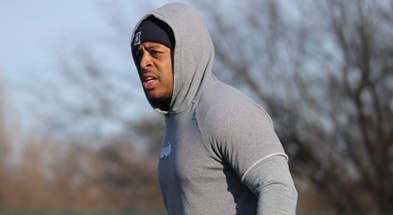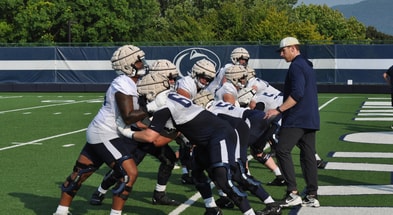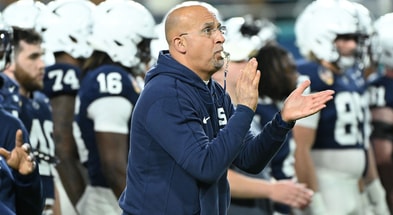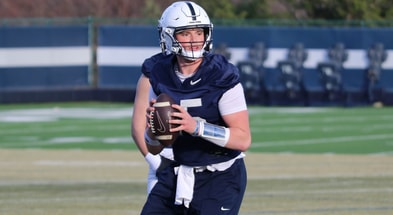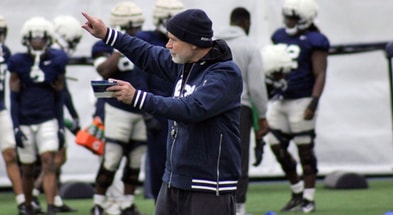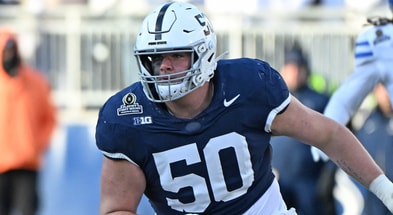Everything Penn State coach James Franklin said at his Tuesday news conference
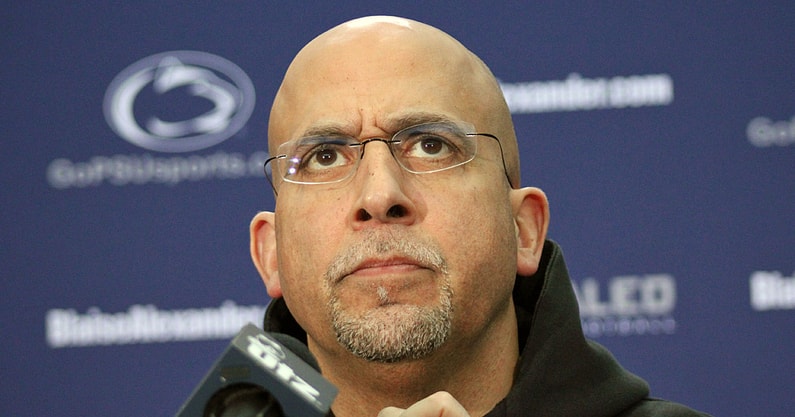
Penn State coach James Franklin held his first news conference of 2024 on Tuesday. The Nittany Lions’ 11th-year leader had plenty to say on a variety of topics. He did not start with an opening statement as he usually does and instead proceeded right to questions. The first asked for his opinion on the newly-announced plan for the SEC and Big Ten to collaborate on trying to figure out a plan for the future of college athletics.
“Well, I think the first thing is I just think it’s positive that I think commissioners in a lot of ways are really, you can make the argument, maybe the only people that can really get this thing fixed right now,” Franklin said. I love the fact that the Big Ten and the SEC have stepped up to have a leadership role, a significant leadership role in this, and are using their voices.
“As we all know, we have some tremendous challenges right now in college athletics as a whole, but specifically college football. To see our conference and the SEC step up, I think really right now is the only solution. I feel good about it. We have a call this week as a Big Ten, as head coaches and commissioners, excuse me, the commissioner. I think that will be important moving forward.”
Watch the rest of Franklin’s news conference above and read the full transcript below courtesy of Penn State Athletics.
What are the Penn State spring priorities?
JF:
Obviously the first thing is, and we’re working on this right now every morning, really coming up with Penn State offense, defense and special teams. Really now three coordinators were hired under the idea that we really need to do what’s best for Penn State moving forward. I know that sounds obvious.
I guess what I’m saying is, what are the things, terminology-wise, that can stay the same? What are the things that should change and need to change? What are the non-negotiables for the coordinators? All these things were discussed in the interview process. But it’s another thing to actually do it. So good discussions going on, on offense, defense and special teams.
I think the players would like for us to be further along in terms of install, but we want to make sure we’re doing it right and we want to make sure we’re all on the same page so we’re not having to go back and reteach things.
I think it’s been really good. I think all three coordinators have done a really good job of jumping in with both feet. Obviously, we had to finish up recruiting, which was the priority at that time. Now the priorities on our current roster, making sure those guys are taken care of.
That’s really what we’ve been grinding on after winter workout this morning. We’ve been typically meeting from about 8 to about 1 on offense and defense. We’ll have a special teams meeting this afternoon. We do a few hours of recruiting every day, as well.
I think that’s obviously the priority, is getting to a point where we feel really good about how we’re going to move forward and what is in Penn State’s best interest in offense, defense and special teams as a coaching staff first, then obviously put the players in a position to feel good about it, as well.
Didn’t feel like where we’re at as a program that we should be starting all over on offense, defense and special teams. That was a big part of the process with hiring the coordinators.
Those two things, the staff first and the players second, is the most important thing. Then after that, obviously being able to figure out where we are from a depth chart perspective.
One of the things that’s exciting is I think we’ll be able to have probably one of the better spring games in my mind that we’ve had in a while because we have enough depth to do that. That will allow us to kind of have a better understanding of where guys are at to come into training camp and to compete for actual starting jobs. None of those things will be decided this spring. We’ll have a better idea of where guys are at.
As you guys know, there will be some guys that graduated and came in early that this spring will be a foundation for them, then summer will allow them to compete. We’ll have a few more guys showing up, as well.
Depth chart, offensive and defensive staff getting on the same page, then obviously offense, defense and special teams players starting to understand and learn the installs and the offense, defense and special teams.
Did the Lions accomplish what they wanted to in the transfer portal?
JF:
Well, I think you guys know you better embrace the transfer portal in college football. I think there’s enough examples of that. But I also think there’s a philosophy behind it, as well.
Are you going to go all transfer portal? The problem is it’s almost like the old days, if you go heavy, heavy junior college, it was almost hard to get out of that because the turnover on your roster was so consistent. It’s the same way with the transfer portal.
We have not been a big transfer portal addition team or subtraction team. I’ve been very, very pleased with that. Obviously, we’re not through it. There’s going to be another wave after spring ball, as we all know. But I’ve been pleased with that.
I think we signed about four guys last year. I think we signed about four guys this year.
What I would also say that I don’t think people realize, is we’ve had a number of guys that didn’t have to come back to Penn State that also came back to Penn State. I think that is important as anything. That’s as important – maybe more so – than going out into the transfer portal and bringing guys in.
As we all know, NIL also plays a major factor in all of this. We want to make sure that, number one, we’re taking care of our current roster first, that’s priority number one. But it is a factor when it comes to the transfer portal and additions in that area, as well.
That’s something we’re going to have to work really, really hard at. So far, so good. For us, it’s our current roster, which is the priority, holding onto those guys. Then where we do have some obvious holes or needs that we need to fix and maybe bring in experience as complementary pieces. We’ll do that.
How long was Tom Allen on Franklin’s radar and what was appealing about the chance to hire him?
JF: Yeah, so again, I think we’ve had a long tradition of great football at Penn State for a long time, going back probably the last 60, 70 years, maybe even longer than that. We’ve been fortunate, Bob Shoop had a top 10 defense if I’m right statistically, Brent Pry had a top 10 defense statistically, then obviously Manny had a top 10 defense. We’ve been fortunate there.
I think part of that is it’s a little bit of Penn State’s DNA. I think we’ve done a really good job of continuing to kind of build on that. Feel great about that.
The important thing was who can we hire to continue that tradition and also has similar philosophies to what the roster has already been built on rather than starting all over again. Having a ton of those conversations.
We interviewed a number of high-profile guys, both DCs and head coaches. Again, that’s part of it, right? Who can come in here, is going to embrace it? When you’re coming in here and you’re following arguably a defensive coordinator that had our defense ranked anywhere from number one and number three statistically, you better hire somebody that’s got the confidence to walk into that room, as well. That played a part in it.
Again, we wanted to find somebody that philosophically aligned with what we’ve done, understood our personnel, understood the conference, understood where we’ve been and where we need to go, and also spent enough time talking through all those things, and were comfortable.
I think that’s a big part of our interview process. We try not to leave any stone unturned. We try to talk about everything. Just like we try to do in the recruiting process, we don’t sell people on a dream or a vision. We talk through the reality of where we are and what we need to do.
Tom’s interview was a little bit interesting because it went for like a week literally. [He] came here, had a couple hours to spend with him. Wasn’t able to get all the stuff done in between recruiting and bowl prep, all the things we needed to do. Can you stay for another day, talk for a couple more hours, have it early in the morning, late at night. He did it. Still felt like he had questions he had and I had questions that I had. Kind of went another day, another day, another day, another day.
I think that put him in a position where he was very comfortable. Put us in a position where we were comfortable, as well. Allowed me to feel comfortable what I was signing up for and who I was signing up for. I think it also allowed him to feel comfortable with those things, as well.
Again, when I talk about the non-negotiables, I think when you hire a Tom Allen or when you hire Andy Kotelnicki or Justin Lustig, here are the things I wanted to do, and we need to do to continue on the path we’re on and even take the next step. Are you comfortable with those things? What are the non-negotiables that you have for you to be the best offensive coordinator, best defensive coordinator, special teams coordinator for Penn State? What are your non-negotiables, so I know what they are and make sure I’m comfortable with what they are.
I think it’s been really good. I think Tom’s embraced it. I think it’s also helped him feel comfortable taking the job. He had some people come after him, as well, during the process and then after him deciding to come to Penn State.
Again, I just think him feeling comfortable with all those things allowed him and his wife to turn down some of those and continue kind of going in the direction that we want to go.
In the old days I think a lot of times you hire a coordinator, and they would have the flexibility to bring staff with them, which is understandable. As you guys know, I’m a loyal guy to Penn State, I’m a loyal guy to the staff, I’m a loyal guy to the players. I think we got a great staff here. That was another big part of the people we were hiring, they had to be comfortable with the current staff.
I think under the new college football what helps with that a little bit is the analyst positions allowed me to retain the staff that we currently had, but then also be able to bring some people in so he had some familiar faces in the room and also people that could help in the transition, whether it’s Indiana to Penn State or whether it’s Kansas to Penn State or whether it’s Vanderbilt to Penn State. So those things I think have been helpful.
Is hiring Andy Kotelnicki a signal that Penn State and Franklin are changing their philosophies on offense?
JF: Yeah, I think your point was fair right after Joe, but I think that changed. I made some coordinator hires that were veteran coordinator hires that I would not say were in that model.
If you looked at us over the last couple years, although the last coordinator was more of an 11-personnel guy, that was not necessarily our strength as an offense. Our tight end room is one of the better tight end rooms in the country. I believe you better have enough flexibility within your system to play to the strengths of your roster. I would say that is probably uncommon in Coaching 101 and college football. Everybody says that during the interview process, but very few people actually do it.
I thought we did a pretty good job of playing to the strength of our personnel. If you look at how much we had 12 personnel on the field and 11 personnel. Just like I tell our tight ends and I tell the receivers and the coaches, the third receiver is competing with the second tight end to see who should be on the field. You’re not just competing with the other tight ends, you’re just not competing with the other wide receivers, you’re competing across rooms to see who should be on the field. It needs to be our best players.
I think, based on how we played the last couple years, I don’t think that was an extension of the Joe Moorhead style of spread offense that we were running.
I think what Andy was doing at Kansas was very similar. The difference, as we’re all very aware of, and trust me I’m aware of, is what his strength is, explosive plays. I think they were sixth in the country in explosive plays but doing it in similar formations and personnel groups that we were in.
We were number one in the country in turnover ratio, which is a team stat but our offense did a great job of protecting the football. What you’re obviously trying to do is marry those two things: the protection of the football on offense, the explosive plays from Kansas, the ability to use different personnel groups that I think is a strength of ours, combined with what Andy did at Kansas. That’s where I think it made sense to him and made sense to us. Obviously, as we all know, again, the explosive plays were a big, big part of that.
I hope that answers your question.
On new Penn State receiver Julian Fleming
JF: I think you guys have heard me say before, one of the things that I would prefer to do when possible is, if we go to the transfer portal, more times than not I would love it to be a guy we recruited on the front end. It’s a shorter amount of time for the players, parents and our staff to get to know each other. It’s a mad dash to figure those things out during a short period of time.
On top of that, we have a challenge that a lot of schools don’t. We start about a week earlier than most schools for the spring semester, which that’s something I don’t think it’s talked about a whole lot. The schools that have a huge amount of time over their Christmas break for where their spring semester starts, they have a huge advantage in the transfer portal.
The earlier your school starts, the more challenging it is. Then you also see a lot of schools that have a ton of second-half classes. The last eight weeks of the semester they have a bunch of options that way, or online classes. We don’t have a lot of those things. If we can’t get guys accepted early and here, it’s going to be really challenging.
Julian was a really good example. Obviously, you guys know, it’s been discussed and reported on a lot, there was a long and lengthy and extensive recruiting process for him and his family. For a while there we felt like he was coming, then we ended up losing him. Now, he’s back with us.
Top 10
- 1New
Lane Kiffin
Jabs Brian Kelly, Kirby Smart
- 2Hot
Potential landing spots
For Nico Iamaleava
- 3Trending
Mel Kiper
3-Round Mock Draft
- 4
Jaydn Ott
Top transfer RB signs with OU
- 5
Marcus Freeman
Reacts to Nico Iamaleava
Get the On3 Top 10 to your inbox every morning
By clicking "Subscribe to Newsletter", I agree to On3's Privacy Notice, Terms, and use of my personal information described therein.
I think there’s familiarity and comfort there for him and his family. I think there’s familiarity and comfort for us. Then obviously his ability to play in this league I think is helpful. He kind of understands what this league is all about. He also has an understanding about the Playoffs, as well. I think those things are valuable. He’s an older guy, which I also think helps in that room.
I think at the end of the day, again, whether it’s high school kids or whether it’s transfer portal as well, we don’t make promises. Guys are going to have to come in here and compete and earn jobs. We’re not making promises and offers to guys that they’re going to come in here and start. They’re going to earn it.
Julian has done a really good job, like most scenarios, whether it’s a job or a team you’re joining, I think the first thing you do is you kind of keep your mouth shut and your ears open and put your head down and go to work and earn everybody’s respect. Over time, gradually you start to become more vocal, if that’s part of your leadership style and personality.
I think he’s done a good job of that. I’ve heard really good reports from the strength staff, from the coaches and from the players probably most importantly. He’s done a good job with all those things. So far so good.
On new Nittany Lion offensive tackle Nolan Rucci
JF: Nolan again, very similar storylines, as you guys know. The difference there is Nolan has got multiple years left of eligibility, which I think is also helpful. Then I think the other thing is he played in the bowl game and played really well in the bowl game. I think that was a big confidence boost for him. I think for us as coaches, we knew very well what he was capable of, but there wasn’t a whole lot of evidence of it at Wisconsin. They stayed very healthy and didn’t rotate players the way we have. Him playing in that bowl game I think was really important for both sides.
He’s done a nice job. I think you guys saw; we updated the roster. We’ve had a number of guys that have put on significant weight already. I think that was an issue for him early on, especially under the old regime at Wisconsin that wanted to be massive. I think he got here 299. I think he’s 305 right now. He’s still skinny because he is all of 6’8″. 6’8″ isn’t always a positive thing for offensive linemen if you can’t bend, but he can really bend. He’s got tremendous athleticism.
Again, we knew a ton about him and the family. He’s been great. He’s been really good. I think there’s a lot of excitement with the coaching staff and the strength staff.
I know our players, I hear it constantly from our high school recruits as well as the transfer portal guys, our guys, our current players, do a really good job of embracing those guys and putting their arms around them, kind of teaching them how we operate and how we do things around here. I think that’s been really good.
Nolan, Julian, a lot of those guys, Kimber and AJ, I think that’s gone really well. I think there’s a lot of excitement about really that group.
Obviously, spring ball will tell us a lot.
What is college football from a coaches’ perspective in 2024? Is it sustainable long-term?
JF: Well, first of all, let me say this. I know really nobody wants to hear from college football complaining about the current model because of the money. I get that. I do. I want to kind of preface my statement.
But I do think the Big Ten and the SEC commissioners taking a leadership role in this is really important because it’s not headed in a good direction really for anybody. I don’t think it’s the right thing for players. I think you guys have heard me speak on this before. I think when coaches went too far and were limiting where players could transfer to, they were abusing that. We went from one extreme to the other.
You can’t tell me that it’s good for the student-athletes to transfer three, four times. Every time you transfer, the likelihood of graduating goes down. I don’t think that’s in anybody’s best interests.
The ability to overcome adversity I think in college athletics is really important. I think we’ve lost some of that. The path of least resistance.
Obviously when you get into NIL, that’s a factor. I think what you’re seeing is my biggest concern is you’re having people leave college football that would have never left college football because a lot of the head coaching positions, coordinator positions and assistant coaching positions, it’s gotten further and further away for what they signed up for.
Everybody knew you had to recruit to coach them. There was a balance between those two. But all these other things are taking you further, further away from coaching and developing kids.
‘Development’ is like a word that isn’t even used anymore. It’s like I told the players when they showed up on campus and their parents, You came here because we want to develop you. If you decide to jump in the transfer portal a year from now, you don’t give us the time to develop you, you’re almost forcing us to go into the transfer portal.
Teams that are heavily transfer portal teams, they’re basically saying, We’re not going to develop, we’re just going to go out and get guys that we know are proven commodities and have them come to campus.
There’s a fine line again all of this.
The thing that probably concerns me the most is I worried probably five or more years ago when the money kept going up that I think college football started to attract people into the industry for the wrong reasons. Maybe I’m old school, but I still truly believe that if you’re coaching college football, you should be coaching it because you care about the kids and their total development, academically, athletically, socially, spiritually, the whole package.
I think because of the changes, people were getting into college football for things that didn’t align with that. So we’ve been on a slippery slope for a while.
The reality is the college football that we’ve all known, the college athletics that we’ve all known, that’s not coming back. You’re going to have to embrace the current model that we’re in. That doesn’t mean that we can’t make it better and can’t still get back to something that I think is in the student-athlete’s best interest long-term, long-term, as well as still be able to complement what’s happening in a university setting, which I think has also been something that’s been very, very important for a long time.
But there’s going to have to be some tough decisions that are made from people that are in the position of power to get those things done. If not, you’re going to continue to see coaches leaving college football and you’re going to continue to see student-athletes transferring three and four times. Again, I don’t think that’s in their best interest either for what we’re really trying to accomplish here. Again, long-term.
I know I’m talking a lot right now. I think that’s where you’re trying to find a balance. What do we need to do short-term for the student-athletes, which they deserve? What also is going to still prepare them long-term for sustained success?
We’ve all heard really challenging stories about professional athletes when they get done playing and the real world hits them, the reality of the real world hits them and they’re not prepared for that because they don’t know what the next stage of their life is.
I think you’re going to see that really push forward because you’re having college athletes that are not going to have the opportunity to go pro afterwards, and they’re going to get hit with reality a lot sooner.
A lot of things have to happen. I love that the Big Ten and the SEC are taking leadership roles and hopefully can do what’s best for everybody because we need that right now.
Why did the Lions target AJ Harris in the transfer portal?
JF: AJ, a little bit different than Kimber, right? Kimber had played a ton already. AJ again I think falls into that category, maybe not exactly like Julian and not exactly like Rucci, but we recruited AJ out of high school. There was some history there. That helped.
Again, was also a highly, highly recruited young man. High profile. We loved his high school tapes, although he hadn’t played a whole lot this past year. Was still close enough to what we recruited out of high school that we felt confident in that.
One of the things with him right away is literally we got on the phone with him the first time, and then we got on the phone with him the second time, and he had done his homework. He knew our roster. He knew the coaches. He had watched our film, studied our film, looked at the data, where we were ranked, how we played defense. Right away this guy was talking about the things in my mind that really matter. That’s what was important to him and his family about choosing the right place from a fit perspective that was going to allow him to achieve his goals both on and off the field.
Parents were awesome, as well. There was alignment from that standpoint. All really different stories. A guy with one year of eligibility, another guy with two years of eligibility, another guy I think with four years of eligibility.
Some of them we felt strongly enough about what they did in high school that we felt comfortable taking them now, whether that was one year removed from high school or three years removed from high school. There are other guys, which I think is the more probably normal mode in the transfer portal, to take proven commodities that have already done it on the college level. We kind of had a balance of all those things.

